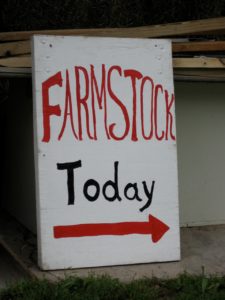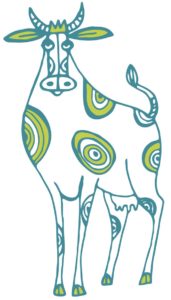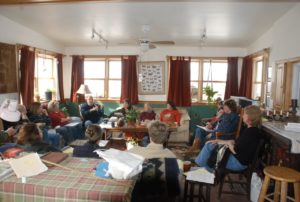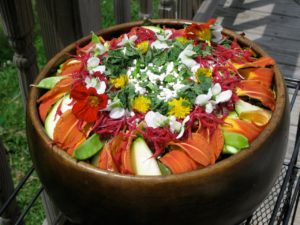Farmstock: For Farmers, By Farmers!
A group of farmers in Sullivan County take a pro-active approach to rural economic development.

In 2012, eleven farms will participate in 12 weekend programs.
In spring of 2009, I was one of five farmers in Sullivan County, NY that came together to create an agri tourism program. We are in WOODSTOCK country, the site of the famous peace and music festival held in 1969, so we chose a psychedelic cow and called our program FARMSTOCK. Our joint effort eventually became the Sullivan County Farm Network.
Our farms were different: dairy, raw milk, sheep, goats, maple syrup, honey, hay, and renewable energy. Yet, most of us had experience working together, either running for town office, developing town farmland protection plans, or serving in community organizations. We were all apprehensive about the future of farming in our community. Rather than wait for things to happen, we decided to work together to expand farming of all kinds in Sullivan County. Wasn’t that the most promising approach to rural economic development?
In our first year, FARMSTOCK invited the public to visit our farms. About 250 people came to see cows milked, learn to make cheese, take a wagon ride, and see a farm’s solar panels. We received a $1,000 grant from PURE CATSKILLS/NYC Watershed Agricultural Council, a local non-profit, which we used for seed money such as printing flyers and advertizing. Now in our third year and without any additional funding, eleven farms will participate in 12 weekend programs.
As FARMSTOCK evolved, so did a core group of leaders and a clear focus of work. We had our first Network public meeting in March 2010: about 50 people attended. We explained our purpose:

Our psycodelic cow logo for agri tourism in Woodstock County
to increase farming activities in Sullivan County and to strengthen communication between those who grow food and those who eat it.
At that meeting, we also summarized opportunities for farming: the proposed red meat plant, the possibility of a local creamery and a grass pellet business, and ways to get help to reduce farm energy costs. Farmers told their own stories: Richard Dire shared progress on his year long work to get a raw milk license. Mary Tonges talked about expanding their dairy farm to cheese making and selling to local supermarkets and at the Green Market in New York City. Alice Diehl informed us about her maple and honey production; and Cindy Gieger talked about solar energy production on their dairy farm.
This grass roots Network is now a year and a half old. We have a data base of contacts, a web site (Sullivanfarmnetwork.org), a face book page, a first newsletter done and the second being prepared. We have even received an unsolicited grant in the amount of $1,000 from a local not- for-profit group that promotes responsible agricultural development.
Our leadership team now is 6 women. Cindy Geiger and Alice Diehl are full time dairy farmers; Alice also processes maple syrup and honey. Amy Erlwein milked cows for many years; now she raises heifers and sells hay. She will soon begin a new business making compost. Sonja Hedlund raises goats and sheep, and has a year around educational program on small-scale farming, cheese making and renewable energy. Jen Diehl operates a farm market in summer and is moving to expand her own production of produce. Elinor Young runs a horse stable, boards and trains horses. She and Jen have years of experience in marketing and using the Internet. They take care of outreach and our contact list and work with the media. Amy has years of experience as a farm store staffer, buying and selling food and understands how to get local products to market.

Frank Kipe tells Sullivan County famers how his micro creamery system works. Photo by Sonja Hedlund
And there has been much help from our friends. Daniel Branch developed our web page and is our technical advisor. Cheyenne Miller, a farm intern, manages our contact list and posts on the face book page. Sarah Sills, a Brooklynfree lance designer, creates our flyers. The Sullivan Alliance for Sustainable Development is our not-for-profit sponsor until we have our own 501c3 status. Challey Comer of PURE CATSKILLS keeps us informed of regional developments in agriculture.
Our work has three tracks: speaking out to support farming at public meetings on economic development, informing existing and potential farmers of opportunities to develop farming, and enlarging our contact list.
We regularly attend county monthly meetings on economic development. One of our team is our liaison to the Sullivan County Cooperative Extension and another to the local Farm Bureau chapter. We always ask questions and often make suggestions. For instance, the group is offering suggestions to our county for how to spend a pot of $300,000 from millennium pipeline companies. We proposed small grants to farmers and small businesses for specific business expansion. We have learned that a farmer at a meeting of government officials draws attention; we are never afraid to speak out.
The Network seeks to inform existing farmers and those wanting to farm of agricultural opportunities. Sullivan County farmers have valuable experience in farming. They are dedicated professionals, hard working people who have survived many ups and downs in the marketplace. But farming in 2011 is not the same as it was in 1990.

A salad of wild edibles at a Farmstock meeting hosted by Apple Pond Farm. Photo by Sonja Hedlund
With experts as presenters, we organized sessions on how to set up a micro creamery, how grass pellets work, on opportunities to sell a portion of one’s fluid milk to a new creamery targeting metro New York City customers. We have organized trips to see a local micro creamery and to attend a program in a neighboring county on how to market products. We will soon have visited every dairy farm in the county. We were a major player in the creation of the first winter indoor farmers market. We interviewed shoppers on three separate occasions to learn their reasons for attending, the amount of money they spent and weather they shopped at town stores after the farm market. With new farmers in the area and many farm interns too, we joined with PURE CATSKILL and developed a Collaborative Regional Alliance for Farmer Training chapter here. C.R.A.F.T (www.craftfarmapprentice.com) connects experienced farmers with aspiring ones. We do not focus on signing up members nor do we say that we ‘represent’ farmers. Instead we present ourselves as advocates for expanding agriculture as the best road to rural economic development.
We have almost 200 people in our excel contact spreadsheet; people who have attended our meetings, others we know to be interested in agriculture. We use e-mail notes and a quarterly newsletter to reach people. However, in this rural county high speed connections are expensive, and many on our contact list are not connected. We have to mail our newsletter out; the printing and postage of each mailing is about $200.00. Money well spent.
The leadership team meets about twice a month, in someone’s house. We share news, concerns and make plans. One member frantically takes notes of topics discussed, decisions made and who is doing what. In it all, there is a great deal of laughter and joy. Farming is worth the struggle, and we enjoy ourselves through it all!

